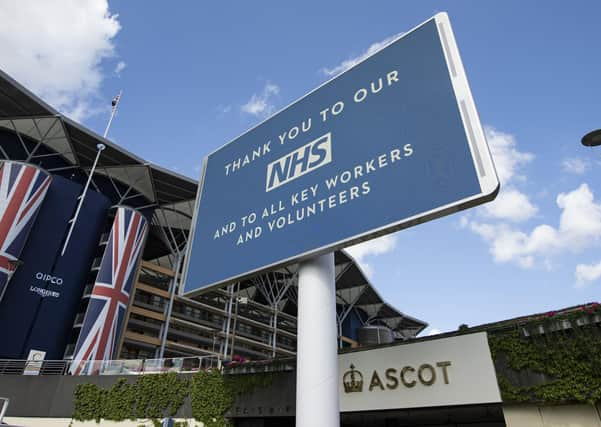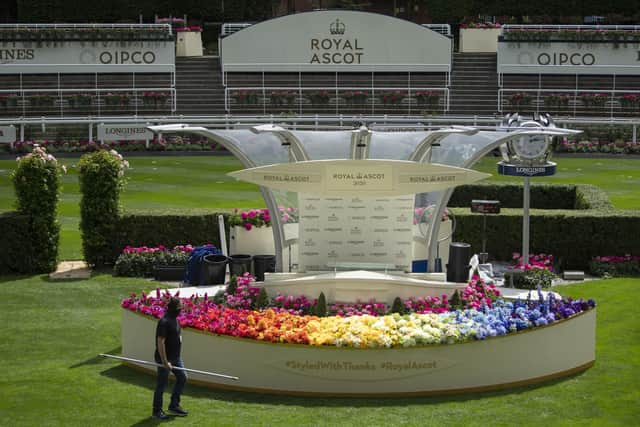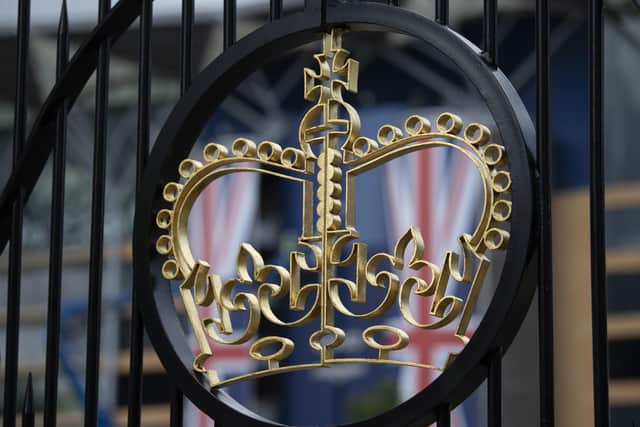Royal Ascot at times of national strife; how the meeting keeps beating the odds


THIS will be a Royal Ascot like no other when horses enter the starting stalls at 1.15pm today – the first race of the five-day flagship fixture.
No Royals – the Queen will be watching from near Windsor Castle. No crowds in their fashion finery – owners have been forbidden. And no Frankie Dettori flying dismounts – not even if his Stradivarius wins a third Gold Cup.
Advertisement
Hide AdAdvertisement
Hide AdYet, first run in 1711 when Queen Anne decreed that Windsor Forest was ideally suited for horse racing, this is not the first time that the meeting has taken place at a time of national uncertainty.


The ‘Black’ Royal Ascots: Queen Victoria died aged 81 on January 22, 1901, bringing her then record 63-year reign to a close. Royal Ascot was held in a sombre mood with the Royal Stand closed and the racecard featuring a black border.
The new Sovereign, King Edward VII, was also absent from the Royal meeting in 1901, although this was on account of appendicitis which resulted in his coronation being postponed.
King Edward VII, a great devotee of the turf, himself died on May 6, 1910. Royal Ascot again saw a dominance of black attire, with no royalty present.
Advertisement
Hide AdAdvertisement
Hide AdAscot at War: In the First World War, the racecourse became a base for the Royal Flying Corps. A cinema for servicemen was opened and made available to the public.


Similarly, the Second World War resulted in Royal Ascot being suspended, with the Grandstand providing accommodation for gunners of the Royal Artillery.
When Royal Ascot did return in 1946, austerity and rationing meant that the dress code switched from morning dress to lounge suits and service dress.
Industrial strife: The weeks leading up to the 1955 meeting were dominated by a national rail strike.
Advertisement
Hide AdAdvertisement
Hide AdWith police deployed on the streets of London, and unable to be spared at race meetings, the 16th Duke of Norfolk – the Queen’s Representative at Ascot – became an unlikely saviour.
He went to see Her Majesty where she consented to attending Royal Ascot if it was delayed and diary commitments permitted.
As a result of this shuttle diplomacy, the meeting began on July 12 – a month later than usual – with the Queen in attendance.
As for the strike, it was called off on June 14 – the day Royal Ascot had been due to begin in 1955 as Sir Peter O’Sullevan, the peerless commentator, mused that Aslef, the rail union, stood for ‘Awfully Sorry, Lost Every Farthing’.
Advertisement
Hide AdAdvertisement
Hide AdMeanwhile racing was not immune from the industrial unrest of the 1970s, with the bitter Stable Lads Strike taking place over 10 weeks between the April and July of 1975.
There was a march by stable lads on the course itself and BBC outside broadcast staff declined to cross a picket line outside the course, meaning there was no TV coverage.
The racing itself was unaffected as Lester Piggott teamed up with the great Sagaro for the first of the horse’s three Gold Cup victories.
Resolution came in time for TV coverage of the King George VI & Queen Elizabeth Stakes on July 26, which saw the “Race of the Century” between Grundy and Bustino.
Advertisement
Hide AdAdvertisement
Hide AdFoot-and-mouth: The UK’s first outbreak of foot-and-mouth disease since 1967 hit racing, with the Cheltenham Festival cancelled.
Racing had returned to normal by the Royal meeting, but spectators still had to walk over mats soaked with disinfectant.
Royal Ascot comes to York: The construction of a new £220m grandstand saw the meeting move to York in 2015 when Shamardal, who went on to become one of racing’s greatest sires, won the St James’s Palace Stakes. A very different atmosphere to Ascot, what was so memorable was the extent to which those present embraced the racing.
Editor’s note: first and foremost - and rarely have I written down these words with more sincerity - I hope this finds you well.
Advertisement
Hide AdAdvertisement
Hide AdAlmost certainly you are here because you value the quality and the integrity of the journalism produced by The Yorkshire Post’s journalists - almost all of which live alongside you in Yorkshire, spending the wages they earn with Yorkshire businesses - who last year took this title to the industry watchdog’s Most Trusted Newspaper in Britain accolade.
And that is why I must make an urgent request of you: as advertising revenue declines, your support becomes evermore crucial to the maintenance of the journalistic standards expected of The Yorkshire Post. If you can, safely, please buy a paper or take up a subscription. We want to continue to make you proud of Yorkshire’s National Newspaper but we are going to need your help.
Postal subscription copies can be ordered by calling 0330 4030066 or by emailing [email protected]. Vouchers, to be exchanged at retail sales outlets - our newsagents need you, too - can be subscribed to by contacting subscriptions on 0330 1235950 or by visiting www.localsubsplus.co.uk where you should select The Yorkshire Post from the list of titles available.
If you want to help right now, download our tablet app from the App / Play Stores. Every contribution you make helps to provide this county with the best regional journalism in the country.
Sincerely. Thank you.
James Mitchinson
Editor
Comment Guidelines
National World encourages reader discussion on our stories. User feedback, insights and back-and-forth exchanges add a rich layer of context to reporting. Please review our Community Guidelines before commenting.